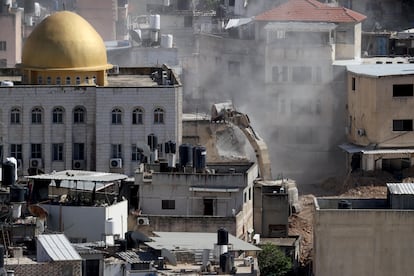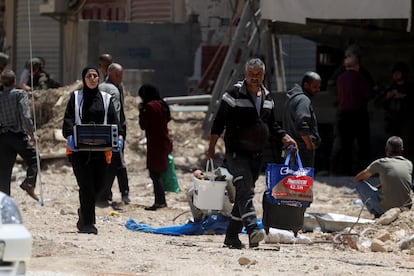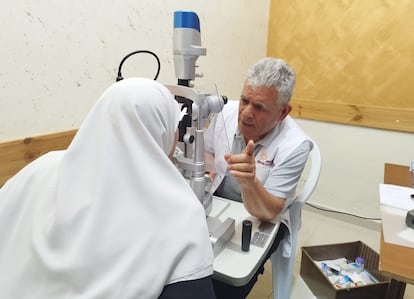Israel's other war against Palestine: nearly a thousand dead in the occupied West Bank since the start of the Gaza war
Najwa Abu Swerim, 58, lost her 39-year-old son, Raja'e, in an Israeli army raid on the Nur Shams camp. “He was married and leaves behind four children, two girls and two boys, ages 2, 5, 8, and 9,” the mother emphasizes first. “They entered the house and, without asking for identification or giving any explanation, took over my husband, my son, and my 9-year-old grandson. They used my son as a human shield; then they threw him from the second floor, and when we found him dead, parts of his body were missing—half of his brain and testicles were missing—and there were bullets inside his torso,” she describes calmly, accompanied by her youngest granddaughter, sitting on a plastic chair very close to where she used to live until her family and home were destroyed. “That day, 13 people died, all civilians,” she says. “We didn't expect something like this to happen to us. My son was just going from home to work and from work to home.”
Najwa Abu Swerim’s son is one of 943 Palestinians, including at least 200 children, who have been killed by the Israeli army or in violent clashes with settlers in the occupied West Bank, including East Jerusalem, in the past twenty months: between October 7, 2023, and June 7, 2025, according to data from the UN Office for the Coordination of Humanitarian Affairs (OCHA) . The agency notes that two-thirds were killed by gunfire and that there were also 9,010 injured during the same period.
The daily massacre committed by the Israeli army in the nearby Gaza Strip is capturing international attention, but the situation in the less visible West Bank is also alarming.
The Palestinian population and organizations operating in the territory to provide health, protection, and education services agree that, since the start of the war in Gaza on October 7 two years ago, when Hamas killed 1,200 people and kidnapped more than 250, violence and oppression in the West Bank have skyrocketed. In 2025, they have even noted a resurgence of hostilities, with the approval of plans to dismantle refugee camps. Of the nearly 1,000 deaths in the past 20 months, OCHA notes, 137 were killed since the beginning of this year alone; 27 of them were children.
UNRWA's director for West Bank affairs, Roland Friedrich, points out that "the West Bank is not a war zone" and is therefore "governed by international standards and codes of conduct for law enforcement, which Israeli security forces are obliged to respect."
However, mass demolitions of refugee camps continue in the northern West Bank as part of the Israeli operation launched on January 21. The Tulkarem camp has been dismantled since June 6, following weeks of similar home demolitions in the neighboring Nur Shams camp (also located in the town of Tulkarem), which are still ongoing.

Some 13,000 people lived in Nur Shams. This camp was established in 1952, three kilometers east of Tulkarem, on land leased by UNRWA from the Jordanian government. Housing connected to water and electricity was built there for refugees from the villages surrounding Haifa. Nearly 75 years later, most have been born and raised there.
Because Tulkarem is so close to present-day Israel (the Tel Aviv towers can be seen from the highest areas), it is one of the areas in the West Bank with the largest number of refugees from the Nakba, the flight or expulsion from their homes of two-thirds of the Arab population in the current State of Israel between 1947 and 1949, in the face of the advance of Jewish militias and, later, the army. With more than 20,000 people, the Abu Sariye camp was the second most populated (after Balata, in Nablus). The other Tulkarem camp, Nur Shams, housed 13,000 people, according to Nihad Shawish, 50, the civilian head of this camp. “Today it’s a ghost town,” he laments.
Since the start of the war in Gaza, Nur Shams officials have counted more than 260 "invasions" by Israeli forces, ultimately leaving it empty. Columns of dust rise from the skeletons of the buildings where bulldozers continue to destroy the pavement and some structures. "Their targets are kindergartens, cultural centers, health centers, mosques," says Shawish.
“All these numbers are from before the last invasion, which began on February 9. It's a huge disaster; they've turned the camp into a place where you can't live; it's inhumane,” he laments. Since the start of the war in Gaza and up to four months ago, 270 homes had been demolished and 1,500 damaged; in recent months, another 400 have been demolished. “Twenty were completely burned. There's no life left; the Israeli army destroyed it,” Shawish says.

All the people who lived there have moved to relatives' homes or tents, or have rented space with the small subsidy offered by the Palestinian Authority. Thus, they are increasingly overcrowded and in worse conditions. "We fear that when the Israeli army leaves, there will be no homes to return to," says this man.
More than 100 people have died in these raids; 80% of them were under the age of 18, according to records from Shawish's team, which documents all human and material losses in writing. OCHA reduces that figure to 77 deaths since October 7, 2023, in Nur Shams.
Israel's interest in dismantling this camp stems from its conviction that terrorist groups have formed within it. In fact, most of the deaths and injuries in the occupied West Bank occur during search and capture operations for suspected terrorists. "In the end, they penalize everyone," concludes the site's chief. The most dangerous aspect, he says, is not only being forcibly displaced by the power of arms, but also the fact that Israel is closing all the educational, health, and cultural services provided by the UN.
“It’s a genocide”
According to 69-year-old ophthalmologist Akel Taqz, what Israel wants is to wipe out the Palestinian population in various ways: “There is genocide. In Gaza and also in the West Bank. There they bomb them, here they prohibit us from receiving medical care. They don't care about human beings.”
Taqz sees refugees from different parts of the West Bank with the organization Physicians for Human Rights. The main difficulty she encounters is getting to the clinics, which are set up each week in buildings where plastic barriers separate the clinics and provide privacy. “The biggest challenge is the checkpoints on the roads, because they can delay you four or five hours; and often we don't get to come in,” she notes while waiting for her next patient at one of these health centers in Tulkarem.
That same day, while Taqz was examining a woman's eyesight, Israeli soldiers carried out a widespread operation in Nablus, in the central occupied West Bank. Two Palestinians were killed and at least 15 others were wounded, including two children. Six Israeli troops were also injured in the exchange of fire. The city was subjected to tight movement restrictions, and Israeli forces ordered residents not to leave their homes while the maneuvers were underway.
The relentless Israeli "conquest" of Gaza, in Prime Minister Benjamin Netanyahu's terms, continues its course with bombs. Since October 7, 2023, it has caused more than 55,100 deaths and 127,400 injuries, according to the Ministry of Health in the Hamas-controlled Strip. Meanwhile, the advance in the occupied West Bank intensifies out of focus, meter by meter, house by house, death by death. At the end of May, the Israeli government took an even more significant step in this endeavor with the approval of 22 new Jewish settlements in the occupied West Bank, including the legalization of several already built without government authorization.
“I just want the European Union to stop us.” This is all an Israeli volunteer with Physicians for Human Rights can say, referring to her country's government. Daniel Sehulr, 76, accompanies her in her work providing healthcare to Palestinian refugees. This retired Israeli pediatrician volunteers three times a month at various clinics in the West Bank. In addition to treating children for common illnesses that the inadequate Palestinian public health staff fails to treat, it is important to him that children see that not all Israelis are like the soldiers and settlers who behave “inhumanly.”
Brenda Galaz Vega, Médecins Sans Frontières' mental health coordinator in the southern West Bank, emphasizes that Israeli abuses in the territory not only cause death and physical injuries, but also mental harm. "We receive cases at our mobile clinics of people who have lost a family member, whose relatives have been arrested, who have suffered raids on their homes, or who have to overcome countless checkpoints every day." All this daily hostility has "an invisible impact" on psychological health in a society that, moreover, doesn't talk about it. "There is a normalization of discomfort, with a kind of forced resilience, an adaptation to daily violence." For some people, the expert recalls, the increasingly difficult existence in the West Bank "is the reality of their entire lives."
EL PAÍS





